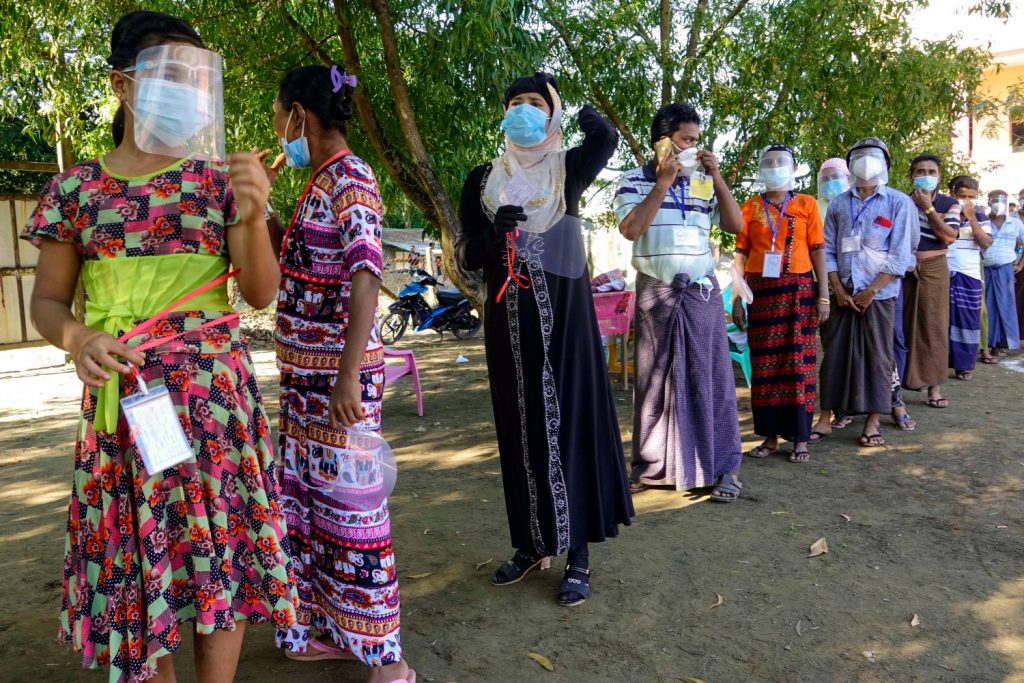A lull in fighting in Rakhine State should not be mistaken for a free and fair election environment, but the efforts of Japanese envoy Yohei Sasakawa towards supplementary elections may deliver other benefits.
By SITHU AUNG MYINT | FRONTIER
Voters in Rakhine State were by far the biggest losers from the Union Election Commission’s cancellation of voting in insecure areas. The UEC’s decision disenfranchised 73 percent of Rakhine’s 1,649,753 registered voters, or about 1.2 million people.
Voting on November 8 was also cancelled in six townships and dozens of village tracts and wards in Shan State as well as parts of Bago Region and Kachin, Kayin and Mon states. However the decision to cancel voting in nine of Rakhine’s 17 townships and in dozens of village tracts and wards in four other townships meant that no ballots were cast in 36 of the state’s 64 constituencies, and many were unable to vote in other constituencies..
Because the cancellations covered most of northern and central Rakhine, where the Arakan National Party is strongest, they likely prevented the party from securing a majority in the state hluttaw. Ethnic Rakhine politicians, encouraged by the informal ceasefire between the Tatmadaw and Arakan Army that has held since the election, have therefore called for elections to be held by the end of the year in the areas where voting was cancelled.
Describing such a ballot as a “supplementary” vote rather than a by-election would potentially circumvent an amendment made last year to section 89(b) of the Pyithu Hluttaw Law, which stipulates that by-elections cannot be held in the first and fifth year of a hluttaw’s term. The earliest that “by-elections” could therefore be held in the cancelled constituencies in Rakhine is early 2022, and representatives of the National League for Democracy have cited this rule in downplaying the possibility of such a vote.
The push for a supplementary election, proposed by the AA and backed by the Tatmadaw, has also received strong support from Mr Yohei Sasakawa, 81, the Japanese government’s special envoy for national reconciliation in Myanmar, who had a behind-the-scenes role in brokering the ceasefire. With the assistance of the Tatmadaw, Sasakawa travelled to Rakhine in early December to meet key stakeholders and discuss the proposal. However, Sasakawa told The Irrawaddy that in a subsequent meeting, UEC chair U Hla Thein had opposed the idea, creating a critical stumbling block.
Sasakawa’s frustration is understandable, but for an election to be successful, it needs to be free, fair and safe. It must also be understood that the UEC cannot arrange an election itself and needs the support of the General Administration Department to compile voters’ lists. It also relies on teachers to perform polling station duties, as well as the special police personnel deployed at polling stations. In some areas, the Tatmadaw also assists with security and sometimes, with logistics. In parts of Kachin State, ballot boxes were transported by Tatmadaw helicopters.
Domestic and foreign observers also played important roles on November 8 as election monitors. For an election to be credible, these observers, as well as candidates and party members, must be able to travel and work freely and safely. An informal ceasefire and the temporary absence of fighting may not be enough to hold a free, fair and safe vote.
Elsewhere, in southern Shan State’s Mongkaing Township, the decision to cancel voting in November was opposed by the Shan Nationalities League for Democracy, Shan Nationalities Democratic Party, Union Solidarity and Development Party and the NLD. However, the Ta’ang National Party had complained to the UEC that it was being threatened by Shan armed group the Restoration Council of Shan State. Although most parties had asked that the election proceed in Mongkaing, it could not go ahead because of threats to one party.
In Rakhine’s southern Taungup Township, three NLD candidates were abducted by the AA on October 14 and remain in its custody. This shows that the environment in Rakhine is not favourable for holding an election, even without immediate fighting.
The various pressures and demands still facing the UEC also make it unlikely that it will have enough time to arrange supplementary elections in Rakhine anytime soon. Much remains to be done by the commission before the existing election process is completed, including accepting candidates’ election spending reports, establishing tribunals to hear disputes over results, and compiling its final report on the vote.
As well as the USDP, which has filed over 1,000 complaints to branches of the UEC, the Tatmadaw continues to question the work of the commission and is focussing its attention on the 218 townships where members of the military and their families cast ballots. The UEC has rejected a request from the Tatmadaw to be able to copy election documents on the grounds that it is unlawful.
Meanwhile, preparations continue to convene the first sitting of the Pyidaungsu Hluttaw for the incoming batch of lawmakers in the first week of February.
However, Sasakawa’s efforts have not been in vain. The informal ceasefire in Rakhine has resulted in tens of thousands of displaced villagers in the north of the troubled state to begin returning home, at least temporarily to harvest their crops.
If the ceasefire holds, it will facilitate economic and social development and enable many thousands of children to resume their education. The AA, which had previously insisted on group negotiations with its allies, has changed its stand and is prepared to hold bilateral negotiations with the Tatmadaw and the government. This is a positive development in the pursuit of peace and one for which Sasakawa deserves much credit.







